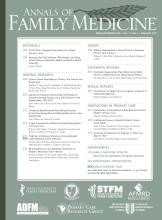Abstract
PURPOSE We wanted to assess the impact of an electronic health record–based diabetes clinical decision support system on control of hemoglobin A1c (glycated hemoglobin), blood pressure, and low-density lipoprotein (LDL) cholesterol levels in adults with diabetes.
METHODS We conducted a clinic-randomized trial conducted from October 2006 to May 2007 in Minnesota. Included were 11 clinics with 41 consenting primary care physicians and the physicians’ 2,556 patients with diabetes. Patients were randomized either to receive or not to receive an electronic health record (EHR)–based clinical decision support system designed to improve care for those patients whose hemoglobin A1c, blood pressure, or LDL cholesterol levels were higher than goal at any office visit. Analysis used general and generalized linear mixed models with repeated time measurements to accommodate the nested data structure.
RESULTS The intervention group physicians used the EHR-based decision support system at 62.6% of all office visits made by adults with diabetes. The intervention group diabetes patients had significantly better hemoglobin A1c (intervention effect −0.26%; 95% confidence interval, −0.06% to −0.47%; P=.01), and better maintenance of systolic blood pressure control (80.2% vs 75.1%, P=.03) and borderline better maintenance of diastolic blood pressure control (85.6% vs 81.7%, P =.07), but not improved low-density lipoprotein cholesterol levels (P = .62) than patients of physicians randomized to the control arm of the study. Among intervention group physicians, 94% were satisfied or very satisfied with the intervention, and moderate use of the support system persisted for more than 1 year after feedback and incentives to encourage its use were discontinued.
CONCLUSIONS EHR-based diabetes clinical decision support significantly improved glucose control and some aspects of blood pressure control in adults with type 2 diabetes.
- Electronic health records
- diabetes mellitus
- quality of health care
- quality improvement
- glucose control
- blood pressure control
- primary health care
- randomized trial
- Received for publication March 29, 2010.
- Revision received August 23, 2010.
- Accepted for publication August 27, 2010.
- © 2011 Annals of Family Medicine, Inc.







